
Information and Communication Technology in Musical Field
Scope & Guideline
Exploring the Harmony of Technology and Sound
Introduction
Aims and Scopes
- Integration of Digital Tools in Music Education:
The journal emphasizes the use of digital platforms and tools in music education, exploring how technology can facilitate learning and enhance pedagogical practices. - Innovations in Music Composition:
It showcases research on contemporary methods and tools for music composition, including the application of artificial intelligence and software in creating and analyzing music. - Music Therapy and Technology:
The journal investigates the role of technology in music therapy, analyzing how digital devices can support therapeutic practices and enhance emotional well-being. - Cultural and Ethnomusicological Studies:
The journal includes studies that examine the impact of technology on cultural practices in music, focusing on ethnomusicology and the preservation of musical heritage. - Virtual and Augmented Reality in Music:
It explores the use of virtual and augmented reality as innovative methods for music performance and education, providing new experiences for both performers and audiences.
Trending and Emerging
- Artificial Intelligence in Music Composition:
Recent papers have increasingly focused on the application of artificial intelligence in music composition, examining its implications for creativity and the future of musical practices. - Digital Transformation in Music Education:
There is a growing trend towards exploring digital transformation in music education, particularly in response to the challenges posed by the COVID-19 pandemic, leading to an increase in online learning models and digital tools. - Music Therapy Innovations:
Emerging studies focus on innovative approaches in music therapy, particularly the integration of digital devices and online platforms to enhance therapeutic outcomes. - Ethnopedagogy and Cultural Sustainability:
Research on ethnopedagogy is gaining momentum, as scholars explore the relationship between cultural identity, music education, and the preservation of musical traditions in a digital age. - Interdisciplinary Approaches to Music and Technology:
There is a notable trend towards interdisciplinary research that combines music with other fields such as technology, psychology, and education, reflecting a holistic approach to understanding music in contemporary contexts.
Declining or Waning
- Traditional Music Education Methods:
There is a noticeable decline in research centered on conventional music education methods, as the focus shifts towards integrating technology and digital tools into teaching practices. - Physical Performance Practices:
Research addressing traditional physical performance practices in music is becoming less frequent, possibly due to the increasing emphasis on virtual performances and digital interactions. - Static Music Analysis Techniques:
The journal has seen a decline in studies using static or conventional music analysis techniques, as more dynamic and technology-driven approaches gain traction.
Similar Journals

Muzikoloski Zbornik
Connecting Scholars Through Musical InquiryMuzikoloski Zbornik is a prominent open-access journal in the field of musicology, published by the esteemed University of Ljubljana Press since 1965. Hailing from Slovenia, this journal has been dedicated to advancing the study of musical heritage, theory, and practice, serving as a vital platform for researchers, professionals, and students alike. With a notable Q2 category ranking in the field of music and a Scopus ranking of 109 out of 180 in Arts and Humanities, Muzikoloski Zbornik showcases high-quality research, fostering discourse and collaboration among scholars globally. The journal embraces a diverse range of topics, from ethnomusicology to music education, ensuring its relevance in an ever-evolving academic landscape. By providing unrestricted access to its content, it champions the dissemination of knowledge and supports the growth of the musicology discipline.

Malaysian Journal of Music
Celebrating the Harmony of Culture and SoundThe Malaysian Journal of Music is a distinguished academic publication dedicated to the exploration and advancement of music and cultural studies within the Southeast Asian context. Published by UNIV PENDIDIKAN SULTAN IDRIS, FACULTY OF MUSIC & PERFORMING ARTS, this journal contributes significantly to the field by disseminating high-quality research and scholarship related to both traditional and contemporary music practices in Malaysia and beyond. Since its inception in 2018, the journal has earned a Q3 categorization in both Cultural Studies and Music, reflecting its commitment to fostering a comprehensive understanding of these interdisciplinary areas. As of now, it ranks 90th out of 180 in the domain of Arts and Humanities focused on Music, positioning it firmly within the academic discourse. The Malaysian Journal of Music serves as an invaluable resource for researchers, professionals, and students alike, providing insights into the rich tapestry of music, culture, and their societal impacts. The journal is dedicated to open access publishing, ensuring that knowledge is shared widely and freely, further solidifying its role as a cornerstone for music scholarship in Malaysia.
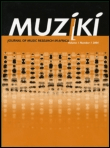
Muziki-Journal of Music Research in Africa
Illuminating the Intersections of Music and Society in AfricaMuziki - Journal of Music Research in Africa is a leading publication dedicated to exploring the rich tapestry of music research across the African continent. Published by Routledge Journals, Taylor & Francis Ltd, this journal has been at the forefront of scholarly discourse since its inception in 2004, providing a platform for innovative and interdisciplinary approaches to the study of music. With an ISSN of 1812-5980 and E-ISSN of 1753-593X, it ensures wide accessibility to both print and digital audiences. As of 2023, it holds a prestigious Q3 ranking in the field of Music, reflecting its commitment to quality scholarship and the promotion of diverse musical narratives. Muziki is particularly invaluable for researchers, professionals, and students seeking to deepen their understanding of African musicology and its socio-cultural relevance. The journal publishes original research articles, reviews, and critical essays, highlighting contemporary developments and historical contexts in music research. With a Scopus rank of 59/180 in the Arts and Humanities Music category, it stands as a respected source for advancing knowledge and fostering dialogue within the global music community.
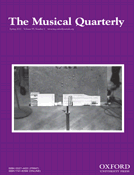
MUSICAL QUARTERLY
Unveiling the Depths of Musical KnowledgeMUSICAL QUARTERLY, published by Oxford University Press Inc, is a distinguished journal in the field of music, with a publication history that stretches back to 1915. This esteemed journal, identifiable by its ISSN 0027-4631 and E-ISSN 1741-8399, provides a critical platform for scholarly discourse, analysis, and research in musicology and related disciplines, facilitating an understanding of both historical and contemporary musical practices. Although it operates without open access, it continues to attract a diverse readership of researchers, educators, and students alike, thanks to its well-curated articles and reviews that engage with music theory, history, and ethnomusicology. With a current Scopus rank of #119 out of 180 in the Arts and Humanities category and a 34th percentile ranking in Music, MUSICAL QUARTERLY plays a vital role in advancing knowledge and fostering collaboration within the music academic community. Its commitment to high-quality scholarship is reflected in its ongoing efforts to address the evolving landscape of music studies, making it an essential resource for anyone serious about exploring the rich tapestry of music scholarship.
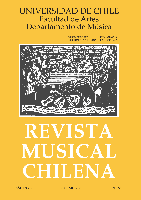
Revista Musical Chilena
Unveiling the Rich Tapestry of Chilean Musical HeritageRevista Musical Chilena, an esteemed publication from the Faculty of Arts at Universidad de Chile, has been a pivotal platform in the field of music and cultural studies since its inception in 1945. With a commitment to open access, this journal promotes the dissemination of innovative research and critical discourse that bridges the gap between cultural theory and musical practice. Holding a notable Q2 ranking in both the Cultural Studies and Music categories as of 2023, it serves as a vital resource for scholars and professionals alike. The journal's inclusion in the Scopus database, with rankings that reflect its influence in the arts and humanities, underscores its significance in shaping the contemporary landscape of music studies. Given its convergence of research output from 2007 to 2024, Revista Musical Chilena continues to engage its audience with diverse scholarship that reflects Chilean musical heritage and global cultural dynamics.

Resonancias
Empowering Scholars to Resonate Beyond Borders.Resonancias is a distinguished open-access journal published by the Pontificia Universidad Católica de Chile, dedicated to advancing the field of music studies. With an ISSN of 0717-3474 and an E-ISSN of 0719-5702, this journal has been promoting scholarly discourse in music since its transition to open access in 2014. Resonancias serves as a critical platform for researchers, professionals, and students alike, enabling them to disseminate knowledge and explore innovative perspectives in musicology. With its current Q2 ranking in the field of music as of 2023, and a Scopus ranking of #108 out of 180, this journal exemplifies its commitment to quality and impact within the academic community, fostering an accessible database of music research from Chile and beyond. Situated at AVENIDA VICUNA MACKENNA 4860, MACUL, SANTIAGO, CHILE, Resonancias not only promotes original research but also includes critical reviews, interviews, and essays that contribute to the rich tapestry of musical knowledge.
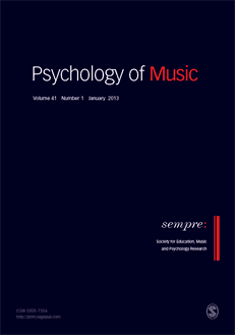
Psychology of Music
Transforming Perspectives on Music and EmotionPsychology of Music is a prominent academic journal published by SAGE Publications Inc, focusing on the interdisciplinary field that bridges psychological principles and musical expression. Established in 1973, this esteemed journal plays a crucial role in advancing understanding of how music affects emotions, cognition, and social interactions, thus catering to a diverse audience of researchers, educators, and practitioners in both psychology and music. With an impressive impact factor that places it in the Q1 category for Music and Q2 for Psychology (miscellaneous) in 2023, this journal ranks 3rd out of 180 in Arts and Humanities – Music, and 19th out of 97 in Psychology (miscellaneous) according to Scopus metrics, affirming its authoritative contribution to the field. The Psychology of Music is essential for those looking to explore cutting-edge research, methodologies, and applications, providing rich insights and fostering discussions that reach into music therapy, education, and psychological wellness. Although it is not an open-access journal, its high-quality peer-reviewed articles are pivotal for anyone dedicated to the intricate relationship between music and the mind, making it a must-read for professionals and students alike.
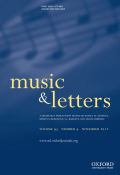
MUSIC & LETTERS
Engaging with the Sonic and the Written WordMUSIC & LETTERS, published by Oxford University Press, is a prominent academic journal that has been at the forefront of musicology and music studies since its inception in 1920. With an ISSN of 0027-4224 and an E-ISSN of 1477-4631, the journal provides a platform for scholarly articles that explore the rich interplay between music and literature, contributing significantly to the understanding of musical context, form, and societal impact. As of 2023, it holds a respectable Q3 rank in Music within its category, positioned at Rank #66 out of 180 in the Scopus Arts and Humanities Music category. Despite not being an Open Access journal, its rigorous peer-review process and commitment to high-quality research make it an essential resource for researchers, professionals, and students alike. The journal's scope encompasses various genres and historical periods, ensuring a comprehensive examination of music's role in culture and community, thereby enhancing the scholarly discourse within this vibrant field. Based in the United Kingdom, at Great Clarendon St, Oxford OX2 6DP, England, MUSIC & LETTERS continues to inspire and inform the global music scholarly community.

FONTES ARTIS MUSICAE
Cultivating knowledge at the crossroads of music and information.FONTES ARTIS MUSICAE, with ISSN 0015-6191 and E-ISSN 2471-156X, is a distinguished journal published by A-R EDITIONS, specializing in the fields of Music and Library and Information Sciences. Established in the United States, this journal serves as a vital resource for scholars, practitioners, and students engaged in the exploration and analysis of music and its associated disciplines. With an established converged publication history from 2002 to 2024, FONTES ARTIS MUSICAE has consistently contributed to the discourse within its scope, reflected in its current quartile rankings of Q4 in Library and Information Sciences and Q3 in Music for 2023. Although not an open-access journal, it offers essential insights and research findings, appealing to a diverse academic audience. Its position within the 18th percentile of the Arts and Humanities (Music) category and 11th percentile in Library and Information Sciences underscores its growing significance in these fields, making it a critical platform for advancing knowledge and fostering collaboration.

Musicologica Brunensia
Innovating the Future of Music ScholarshipMusicologica Brunensia, an esteemed journal published by Masaryk University, Faculty of Arts, serves as a significant platform for the dissemination of knowledge in the field of musicology. Based in the Czech Republic, this Open Access journal has been facilitating scholarly communication since 2009, allowing unrestricted access to its rich array of research articles. With an ISSN of 1212-0391 and an E-ISSN of 2336-436X, Musicologica Brunensia proudly holds a Q3 ranking in the Music category as of 2023, reflecting its dedication to advancing research in the arts and humanities, particularly music. The journal accepts contributions spanning diverse topics within music studies, fostering interdisciplinary dialogue among researchers, professionals, and students alike. Located at Arne Novaka 1, Brno, 60200, Czech Republic, Musicologica Brunensia is poised to continue its journey of promoting innovative scholarship in musicology until 2024 and beyond, making it a valuable resource for anyone passionate about the field.